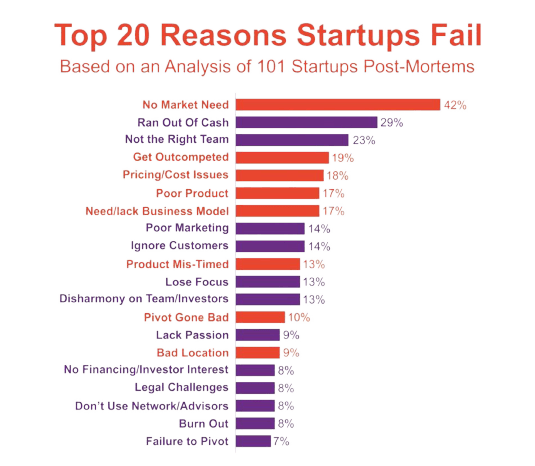Is it possible to establish a tech company or startup without a tech background?
This question remains one of the biggest concerns in the minds of people planning a technology startup. Infact, the question has merit. Building a technology company does require your tryst with technology.
Some quick research though that may bring you courage are that of Airbnb, Tinder, Pandora, Alibaba, etc. All great examples of tech startups built by non tech founders. AirBnb founders came from industrial designing backgrounds, Pinterest were educators and Michael Dell was doing trade and stocks before he started Dell. Steve Jobs too, wasn’t a programmer at all.
The truth is that the best startups around the world are formed with a blend of domain knowledge and technology or rather at a focal point of two or more domains.
The more common traits of these stories would be courage, passion, perseverance, and market timing. To be a programmer is not even on the list of top 10 things that an entrepreneur needs to be successful.

In fact, in my opinion, I consider understanding a domain and being able to recognize the problem areas and how it can be solved using technology is a primary skill to be an entrepreneur. Do not let your ideas be abandoned because you do not know where to start.
You have to understand users first and work upon solving problems for them using technology and not take technology and try to make people use it. The other saying which I keep repeating is that true entrepreneur are those that fold up their sleeves and solve a problem rather than waiting for help to arrive.
At Mindbowser, we often work with founders from non-tech backgrounds. This blog is the amalgamation of things that I tell our customers to do as they get on their journey to build their company.
You need to learn about technology but not programming. You need to manage that things get done and developed, instead of learning how to do or develop them yourself. Coding is just one of many tasks critical to the operation of your organization and there are many areas where you can still make a dent.
So with these ideas in mind let’s dive into 12 things to do to launch a Technology startup after coming from a nontech background.
Yes, you can skip to learn programming, but you have to learn enough to be able to speak with your team and get a feeling of how they are doing.
The front end means the services or applications, a user will experience on a website, software, or application. The back end exists on the servers and features the database, the application layers, etc. that process the data and present information to the front end.
Additionally, when interacting with your team, do Google any term that you do not understand as well as do not shy away from asking questions. There is always an easy, non technical way to explain a technical term.
It’s like if your startup is a ship and you are the captain, you are not to go down and run the furnace but having an understanding of how the engine works, you can understand what your engine guy is doing and may even help him connect the dots with your other skills.
Continuing with the example of being the captain of your ship, you would be the one responsible for setting up benchmarks on quality, reporting and execution. Here tools on project management, testing, scheduling, communication etc will be your allies.
There are many tools that you can learn to effectively manage your team as a manager and CEO. You don’t need to learn to code but you need to set benchmarks on performance and learn tools that help you gauge performance.
Here is a list of 20 non tech tools that you can use.
Having data backed decisions will help to set the right expectations and build the confidence between you and your team.
There would be some areas where the team would look up to you. Most important thing is mastering your industry as the team may totally rely on you for that.
You will be the person with veto power in team meetings on design and feature decisions. Hence, you have to be the person to recognize your user pain points and bring it to the team. You would be the one with a deep understanding of your market, the users and the problem you are trying to solve. Learn deeply about these areas.
Here are 10+ things you need to do as you start your product journey
Communication is your key to a lot of problems. Hence, learn the tools that you can use to communicate your ideas. It can be your expression in words, excel sheets and even sketches that you can create.
You do not need to learn photoshop or be a pro in wireframing, but at least get conversant with simple tools like the Marble app that converts your paper sketch to a prototype. The other trick is to be able to learn and understand the user experience of other popular apps. Start questioning why something is so good or bad? What is the reason people get hooked onto this particular app. These observations will lead you to be a design thinker.
You can always hire a UX expert to build you the complete platform but make sure that you learn the basics of designs to be able contribute to the design discussions.
Apple Human Interface Guidelines and Google Material Design are good resources to get started with.
Learn how to talk to customers, how to communicate to developers, how to measure developer productivity. You don’t have to learn how to code, but you do need to know enough to be able to understand every component of your company. You can’t be the boss otherwise. There are all sorts of free and inexpensive resources out there so no excuse.
You will need to learn about orienting your team in the right direction, getting the best out of them, hiring the right people, setting the right culture and so on.
Another way to help yourself is to ask for help. It is a fact that you can’t be good at everything so when a problem arises with your business, you’ll be needing expert help. For this, you need to build a reliable network and become friends with the people who may be able to help. Actively seek help on what you find puzzling.
The good news is that people in the tech industry are often kind and helpful. Hence, do not be afraid to reach out. Go out there, attend events, network on Linkedin and keep the grind on.
Local events can be found via meetup.com as well as StartupGrind chapters in your city. Fuckupnights.com is great to check out failures and learn from them.
At Mindbowser, my CTO and I teamed up to build an agency that can bring the best of tech and knowledge to founders.
In case you would like to discuss your options further, feel free to get in touch at ayush@mindbowser.com or book a 30 minutes free consultation call!
Get Free Consultation!Accelerators can be a great help into your journey by putting some order to things. Most accelerators have a lot of mentoring and expert sessions that can be very useful. Accelerator programs can also help you partner with corporates for pilot-projects. This is important because even if you don’t end up getting the capital from the accelerator program, you still have the credibility.
Of course, the good accelerators have a serious process to get into. Hence do your homework if you aim to get into one and do not lose sleep if you are not able to make it. A lot of startups were created without going through any accelerator.
Books are the answer to a lot of questions. As you are putting yourself through a journey of unknowns, books can be your light of Eärendil (from the Lord of the Rings)- Lightning up and showing you the way.
Books help you cultivate your thoughts and learn from others who have done it before. Books from other entrepreneurs give you ideas about the concrete plan to launch and execute your business. Even if reading isn’t your area of forte, give it a try. My strong advice would be to understand how other non-technical founders started companies by reading their books.
Here is a list of 30 must-read books for entrepreneurs
Just like books, another source to avoid costly mistakes is to have mentors. Choose your mentors and if possible form an advisory board with multiple people. Meet and update your progress as per cadence and take advice.
It is surprising that founders seek co-founders more than they seek mentors. Having a mentor is equally important. While a cofounder is your partner in crime, your mentor is your teacher to it. Having mentors will give you a huge benefit in understanding the market, network opportunities, confidence, reassurance, and in overall planning.
Software development lifecycle (SDLC) is the process of building software. There are various moving parts in software development and software teams would take one approach or the other to make a plan in solving it. By learning about SDLC, you are learning your development team language and being able to direct them to the right processes or rather identify if a wrong practice is being used.
This way then you can understand where your team is headed and where they are in terms of their progress. You would also be able to build your communication and release cadence accordingly. Additionally, make sure that you are having documentation and you are not stuck with just one guy knowing how everything works. That is a dangerous situation.
The role of CTO is mainly designing the application’s architecture, setting up infrastructure, and taking critical technical decisions. This position needs strong technical skills and a significant amount of experience to tackle the situations.
Bringing in a co-founder CTO is difficult unless you have got funded or have a friend from school or work that believes in you. This has nothing to do with you but the overall demand and supply. There are just so many opportunities for a technology person worth being a CTO that it’s really difficult to find one. Most strong candidates are either part of FANG companies or into a venture-funded startup, or doing their own startup. And yes, they get pitched a lot so you will face a lot of competition for their attention.
As a nontech founder, you will need someone who you can rely on to be able to make technical decisions and take care of the technology aspects. Your better bet is to find a virtual CTO. A virtual CTO can be independent of your technology team or someone from your technology team.
This does not mean that you need to give the reins of your product to someone else. You still need to be the guy to make the call on features and benchmarks, but your technology guy can be the bridge between you and the developers. He/She can convert your vision to action. At Mindbowser, our project manager and CTO become your virtual CTO team.
An important component of launching a tech startup is to have a cofounder that is great at software development. If you don’t already have one, think about your existing friends and past work colleagues. If no one comes to mind, try going to meetups or join YC Startup School. Make sure you and your cofounder’s values and vision are aligned.
Hiring the wrong people is bad for a company, but for a startup, it is fatal. To prevent any loss due to employees’ mistakes and inexperience you need to hire the correct way.
When building your own team, you have to decide between taking the Bottom-up approach vs the Top-down approach.
Bottom-up approach is where you take on all high-level responsibilities, such as technical and marketing strategy, and hire junior to mid-level talent to follow your lead.
Top-down is where you start by bringing in senior people to fill skill areas you feel you are not proficient in CTO, CFO, CMO, etc, and then the rest of them later.
At Mindbowser, we have preferred the ‘top-down’ every time. The idea is surround yourself with the best and the brightest as early as possible. If this means you need to bring people in full-time to get them fully invested then do it. These people will make decisions that will shape your company as it matures – so it makes sense that you receive council from people you trust and whose interests are fully aligned with yours.
Till the time your core is strong enough internally, consider finding a tech partner. As most successful companies do outsource in full or in part, you can decide upto what extent you would like to outsource. Answer to this would be dependent on your own skills, key areas of expertise, and skills of the internal team.
So here are 12 things to keep in mind if you are a non tech founder building a technology company. In summary, building a technology company is hard but not impossible. By taking the right steps and guidance, you can multiply your own impact and for everything else you can outsource or hire.
Read more on things to do as soon as you start your product journey here

We worked with Mindbowser on a design sprint, and their team did an awesome job. They really helped us shape the look and feel of our web app and gave us a clean, thoughtful design that our build team could...


The team at Mindbowser was highly professional, patient, and collaborative throughout our engagement. They struck the right balance between offering guidance and taking direction, which made the development process smooth. Although our project wasn’t related to healthcare, we clearly benefited...

Founder, Texas Ranch Security

Mindbowser played a crucial role in helping us bring everything together into a unified, cohesive product. Their commitment to industry-standard coding practices made an enormous difference, allowing developers to seamlessly transition in and out of the project without any confusion....

CEO, MarketsAI

I'm thrilled to be partnering with Mindbowser on our journey with TravelRite. The collaboration has been exceptional, and I’m truly grateful for the dedication and expertise the team has brought to the development process. Their commitment to our mission is...

Founder & CEO, TravelRite

The Mindbowser team's professionalism consistently impressed me. Their commitment to quality shone through in every aspect of the project. They truly went the extra mile, ensuring they understood our needs perfectly and were always willing to invest the time to...

CTO, New Day Therapeutics

I collaborated with Mindbowser for several years on a complex SaaS platform project. They took over a partially completed project and successfully transformed it into a fully functional and robust platform. Throughout the entire process, the quality of their work...

President, E.B. Carlson

Mindbowser and team are professional, talented and very responsive. They got us through a challenging situation with our IOT product successfully. They will be our go to dev team going forward.

Founder, Cascada

Amazing team to work with. Very responsive and very skilled in both front and backend engineering. Looking forward to our next project together.

Co-Founder, Emerge

The team is great to work with. Very professional, on task, and efficient.

Founder, PeriopMD

I can not express enough how pleased we are with the whole team. From the first call and meeting, they took our vision and ran with it. Communication was easy and everyone was flexible to our schedule. I’m excited to...

Founder, Seeke

We had very close go live timeline and Mindbowser team got us live a month before.

CEO, BuyNow WorldWide

If you want a team of great developers, I recommend them for the next project.

Founder, Teach Reach

Mindbowser built both iOS and Android apps for Mindworks, that have stood the test of time. 5 years later they still function quite beautifully. Their team always met their objectives and I'm very happy with the end result. Thank you!

Founder, Mindworks

Mindbowser has delivered a much better quality product than our previous tech vendors. Our product is stable and passed Well Architected Framework Review from AWS.

CEO, PurpleAnt

I am happy to share that we got USD 10k in cloud credits courtesy of our friends at Mindbowser. Thank you Pravin and Ayush, this means a lot to us.

CTO, Shortlist

Mindbowser is one of the reasons that our app is successful. These guys have been a great team.

Founder & CEO, MangoMirror

Kudos for all your hard work and diligence on the Telehealth platform project. You made it possible.

CEO, ThriveHealth

Mindbowser helped us build an awesome iOS app to bring balance to people’s lives.

CEO, SMILINGMIND

They were a very responsive team! Extremely easy to communicate and work with!

Founder & CEO, TotTech

We’ve had very little-to-no hiccups at all—it’s been a really pleasurable experience.

Co-Founder, TEAM8s

Mindbowser was very helpful with explaining the development process and started quickly on the project.

Executive Director of Product Development, Innovation Lab

The greatest benefit we got from Mindbowser is the expertise. Their team has developed apps in all different industries with all types of social proofs.

Co-Founder, Vesica

Mindbowser is professional, efficient and thorough.

Consultant, XPRIZE

Very committed, they create beautiful apps and are very benevolent. They have brilliant Ideas.

Founder, S.T.A.R.S of Wellness

Mindbowser was great; they listened to us a lot and helped us hone in on the actual idea of the app. They had put together fantastic wireframes for us.

Co-Founder, Flat Earth

Ayush was responsive and paired me with the best team member possible, to complete my complex vision and project. Could not be happier.

Founder, Child Life On Call

The team from Mindbowser stayed on task, asked the right questions, and completed the required tasks in a timely fashion! Strong work team!

CEO, SDOH2Health LLC

Mindbowser was easy to work with and hit the ground running, immediately feeling like part of our team.

CEO, Stealth Startup

Mindbowser was an excellent partner in developing my fitness app. They were patient, attentive, & understood my business needs. The end product exceeded my expectations. Thrilled to share it globally.

Owner, Phalanx

Mindbowser's expertise in tech, process & mobile development made them our choice for our app. The team was dedicated to the process & delivered high-quality features on time. They also gave valuable industry advice. Highly recommend them for app development...

Co-Founder, Fox&Fork
